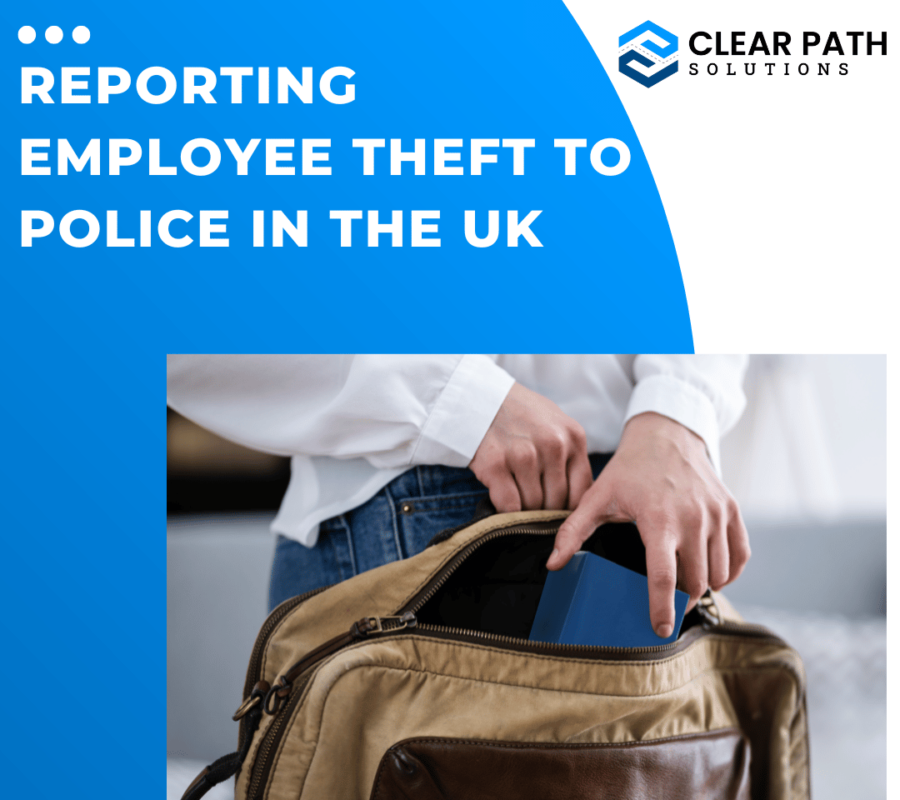How to Report Employee Theft to the Police in the UK: A Clear Path Solutions Guide for Employers
Employee theft is a serious issue that can have legal, financial, and reputational consequences for UK businesses. Whether it’s stealing cash, misusing company assets, or manipulating records for personal gain, any form of internal theft undermines trust and can severely impact company morale.
As a UK employer, it’s essential to handle suspected or proven employee theft in a manner that is fair, lawful, and effective.
This comprehensive guide from Clear Path Solutions, your trusted HR compliance partner, walks you through the steps of reporting employee theft to the police, including legal considerations, internal procedures, and how to protect your business.
What Constitutes Employee Theft?
Employee theft isn’t just about stealing physical items—it’s any dishonest act that causes loss to your business. Common forms include:
- Cash Theft: Taking money from tills, petty cash, or submitting false expense claims.
- Inventory or Equipment Theft: Stealing products, tools, or company devices for personal use or resale.
- Data Theft: Misusing or stealing confidential company or customer information.
- Time Theft: Logging hours not worked, or abusing sick leave and breaks.
- Financial Fraud: Altering invoices, payroll records, or diverting funds.
Each of these can harm your business financially and legally. If suspected, it’s essential to gather evidence, follow due process, and consult HR or legal experts to avoid wrongful accusations.
Step 1: Conduct a Thorough Internal Investigation
Before contacting the police, ensure you’ve gathered sufficient evidence to support your claims.
Key actions:
- Suspend the employee (with pay) if necessary to preserve evidence and prevent interference.
- Conduct interviews with witnesses and the suspected employee, following disciplinary procedures.
- Secure evidence including CCTV footage, transaction logs, access records, or digital activity.
- Document everything: Create a clear, chronological report outlining the alleged theft, the evidence, and the impact.
Be mindful of data protection and employee rights. A rushed or biased investigation can lead to legal complications.
Need help conducting a compliant workplace investigation? Contact Clear Path Solutions’s HR experts for support.
Step 2: Follow a Fair Disciplinary Procedure
Before escalating to law enforcement, it’s often advisable to complete your internal disciplinary process.
This includes:
- Inviting the employee to a disciplinary hearing
- Giving them the opportunity to respond
- Allowing representation (a colleague or trade union rep)
- Issuing a decision in writing
Only after this process should you consider dismissal or police involvement, unless the theft is substantial or poses immediate risk.
A fair process not only reduces legal risk but also strengthens your case should criminal prosecution follow.
Step 3: Decide Whether to Involve the Police
Once you’ve gathered evidence and completed your internal procedures, you must decide whether to report the theft as a criminal offence.
Consider reporting if:
- The value of stolen goods is substantial
- There is clear intent and deception
- The employee refuses to return property or repay losses
- There’s a risk of reoffending or threat to others
You are not legally required to report employee theft to the police—but in serious cases, it may be necessary to protect your business, claim insurance, or pursue justice.
Step 4: How to Report Employee Theft to the Police
You can report the theft in the following ways:
- Call 101 – the non-emergency police number
- Visit your local police station
- Report online via your local police force’s website
- If it’s an emergency or ongoing crime, dial 999
When reporting, be ready to provide:
- A detailed account of the incident
- Evidence you’ve collected (emails, footage, statements)
- The employee’s name and contact details
- Any relevant internal disciplinary documents
Once reported, the police may:
- Record the incident as a crime
- Interview witnesses
- Investigate further
- Prosecute, issue a caution, or decide not to pursue (depending on evidence)
Step 5: Inform Your Insurer and Legal Team
If theft resulted in financial loss, you may be able to claim under your business insurance policy. Most insurers will require:
- A police crime reference number
- Documentation of the incident
- Evidence of preventative measures (e.g., access controls, policies)
You should also speak with a solicitor or employment law advisor to ensure your actions comply with:
- The Employment Rights Act 1996
- The Data Protection Act 2018
- Relevant ACAS codes of practice
At Clear Path Solutions, we provide legal-compliant HR support to reduce your risk and help you recover confidently.
Step 6: Secure Your Business Against Future Theft
After addressing the incident, take steps to prevent future internal theft:
- Implement a clear anti-theft policy and train staff regularly
- Improve access controls (e.g. digital logins, CCTV, audit trails)
- Encourage whistleblowing with a confidential reporting channel
- Regularly audit financial records and inventory
- Foster a transparent, ethical workplace culture
Need help drafting internal policies or training your team? Get in touch with Clear Path Solutions to build a stronger HR foundation.
FAQs
Q: Can I dismiss an employee before reporting them to the police?
A: Yes, if you’ve followed a fair disciplinary process and have sufficient grounds for gross misconduct.
Q: Will the police always prosecute employee theft?
A: Not necessarily. If evidence is lacking or the value is low, they may close the case or issue a warning.
Q: Can the employee take me to tribunal if I report them?
A: Only if you breached employment law in the process (e.g., unfair dismissal, discrimination, or defamation). Clear, fair procedures reduce this risk.
Final Thoughts
Reporting employee theft in the UK must be done carefully, balancing legal rights, business protection, and procedural fairness. By conducting a thorough internal investigation, adhering to proper HR processes, and involving the police when appropriate, you can handle these situations professionally and lawfully.
At Clear Path Solutions, we specialise in helping UK employers stay compliant with employment law—from workplace investigations to dismissal and post-theft policy reviews.
Need Expert Help with Employee Theft Issues?
Whether you’re facing a suspected incident or want to prevent future problems, Clear Path Solutions is here to guide you.
📞 Book a free compliance consultation today
🌐 Visit clearpathuk.co.uk
📧 Contact us here
Protect your business the right way—with Clear Path Solutions by your side.





